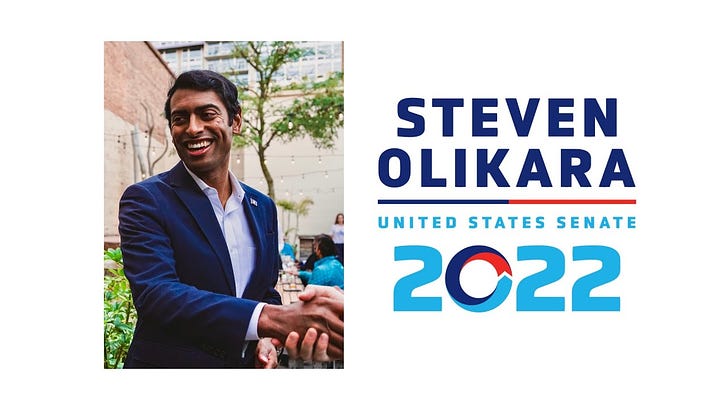Dear Friends,
I’ve known Steven Olikara, Democratic candidate for the US Senate in Wisconsin, for quite some time, and we were happy to interview him in the closing weeks of his campaign. We’re not officially endorsing any candidate in this race at this point, but Steven is the kind of aspirational, values-driven, service-oriented candidate we need more of in our politics, and he deserves the consideration of Wisconsin voters. Moreover, as a service to our readers, this interview provides a window into what will be one of the most intensely-watched elections this cycle as the winner of the Democratic primary will go on to face Senator Ron Johnson in the general election, a race that will be pivotal to determining control of the U.S. Senate next year.
Olikara needs donations today to meet the qualifications to make the debate stage. The primary in Wisconsin will take place on August 9th.
Michael & Melissa
Michael: What convictions drove you to get into this race?
Steven: I believe the levels of polarization and disillusionment in our country are unsustainable for democracy. In our state, 80% of Wisconsinites believe the federal government is fundamentally broken (majorities of Democrats, Republicans, and Independents). We need to change the system. I also believe that Wisconsin, historically the laboratory of democracy and one of the most independent-minded swing states, is the place to unlock a new politics.
The new lane of politics we are building can be summed up in three words: inclusive, populist, reform. My conviction in this new lane stems from my background growing up in Wisconsin. As a son of Indian immigrants, I know what feels like to be an outsider in politics, and it has been a mission to create a government that includes all of us. My experience as a musician was also formative. Playing in bands of nearly every type and genre, I discovered the power of listening and helping people see their common humanity.
Also, as Founder of the Millennial Action Project (the nation’s largest nonpartisan organization of young legislators), I learned how to translate big ideas into concrete legislative action. I learned that the most practical and effective way to make real change is by building diverse coalitions. I also saw that we must change the financial and political incentives in Congress if we want our representatives to do their jobs and work for us.
Michael: What have you learned about our democracy during this campaign so far?
Steven: Running for office is an extraordinary experience. It offers a true window into our democracy. Meeting people at dairy breakfasts, county fairs, backyards, and more is politics at its best. At the same time, there is an underbelly to politics - the big money, the negative ads, the cynical establishment media that tries to silence certain voices. I’ve seen it all in this race. One reform I’ve become most passionate about is changing the campaign finance system to enable more non-traditional and diverse candidates to run for office.
Michael: What does it look like for you to respond to the overturn of Roe as a Democrat running in a purple state? Is there anything you can do or say to bring people together in this moment? How would you like to see national Democrats respond?
Steven: I believe we have to start with real, human stories. When we start with hearing everyone’s lived experience, we start to build empathy and understanding. I believe humanizing the extremely painful decisions that women go through around abortion can help change the politics of this issue, and I hope to help facilitate that. I also believe we need to expose the systemic issue at play. For too long, it’s been far too profitable for politicians to profit on abortion issues, rather than focusing on building the coalition to codify Roe. Instead of national Democrats asking for $15 after the overturn of Roe, they should show us their plan of action to protect women’s rights and freedoms.
Michael: Were you encouraged by the passage of the bipartisan gun safety legislation? What does that suggest to you about the possibility of compromise and progress in our politics?
Steven: I was very encouraged by that. It shows that progress is still possible when we open cross-partisan conversations in Congress. I believe it’s possible to do much more, including across-the-board gun licensing to ensure everyone who owns a gun has demonstrated that they can use it safely.
We hosted a Higher Ground on Gun Violence Prevention Town Hall after the Uvalde and Buffalo shootings with people across the politics spectrum, including gun control and gun rights advocates. We found tremendous higher ground on building greater responsibility and respect into the system. I will never forget a Republican who described purchasing a gun recently. Upon leaving the gun store, he said, “Is that it?” looking for more training and support. Creating a training and and licensing system, similar to the process of getting a drivers license, is a significant opportunity.
Michael: What’s the path forward for you in this campaign, Steven? Are you hopeful?
Steven: I believe our path involves firing up the Democratic base, while activating the Exhausted Majority of disaffected and politically homeless voters. We are bringing thousands of new voters off the sidelines and into our movement. Talking with those voters and seeing many who had lost faith, but are now among our most active volunteers, has given me great hope.
One of my favorite days of campaigning started in progressive blue Madison with workers rights advocates, and finished in a ruby red small town called Neillsville with veterans. Our message, centered on rebuilding trust, bridging divides, and systemic reform, resonated equally as well in both places. That’s a coalition that will transform politics.
I believe we’re going to shock the world.



